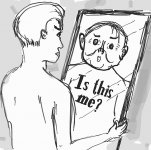
Body dysmorphic disorder (BDD), occasionally still called dysmorphophobia, is a mental disorder characterized by the obsessive idea that some aspect of one's own body part or appearance is severely flawed and therefore warrants exceptional measures to hide or fix it. In BDD's delusional variant, the flaw is imagined. If the flaw is actual, its importance is severely exaggerated. Either way, thoughts about it are pervasive and intrusive, and may occupy several hours a day, causing severe distress and impairing one's otherwise normal activities.
Dislike of one's own appearance is common, but individuals who suffer from BDD have extreme misperceptions about their physical appearance. Whereas vanity involves a quest to aggrandize the appearance, BDD is experienced as a quest to merely normalize the appearance. Although delusional in about one of three cases, the appearance concern is usually non-delusional, an overvalued idea.
The bodily area of focus can be nearly any, yet is commonly face, hair, stomach, thighs, or hips. Multiple areas can be focused on simultaneously. Women tend to focus on their weight, hip size, and body hair, while men tend to focus on body build, size of their genitalia, and hair thinning. Many seek dermatological treatment or cosmetic surgery, which typically do not resolve the distress. On the other hand, attempts at self-treatment, as by skin picking, can create lesions where none previously existed.
BDD shares features with obsessive-compulsive disorder, but involves more depression and social avoidance. BDD often associates with social anxiety disorder. Some experience delusions that others are covertly pointing out their flaws. Cognitive testing and neuroimaging suggest both a bias toward detailed visual analysis and a tendency toward emotional hyper-arousal.
Most generally, one experiencing BDD ruminates over the perceived bodily defect several hours daily or longer, uses either social avoidance or camouflaging with cosmetics or apparel, repetitively checks the appearance, compares it to that of other people, and might often seek verbal reassurances. One might sometimes avoid mirrors, repetitively change outfits, groom excessively, or restrict eating.
BDD's severity can wax and wane, and flareups tend to yield absences from school, work, or socializing, sometimes leading to protracted social isolation, with some becoming housebound for extended periods. Social impairment is usually greatest, sometimes approaching avoidance of all social activities. Poor concentration and motivation impair academic and occupational performance. The distress of BDD tends to exceed that of either major depressive disorder or type-2 diabetes, and rates of suicidal ideation and attempts are especially high.
